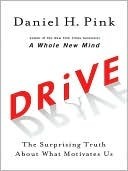The essential requirement: Any extrinsic reward should be unexpected and offered only after the task is complete. Holding out a prize at the beginning of a project—and offering it as a contingency—will inevitably focus people’s attention on obtaining the reward rather than on attacking the problem. But introducing the subject of rewards after the job is done is less risky. In other words, where “if-then” rewards are a mistake, shift to “now that” rewards—as in “Now that you’ve finished the poster and it turned out so well, I’d like to celebrate by taking you out to lunch.”
Welcome back. Just a moment while we sign you in to your Goodreads account.


